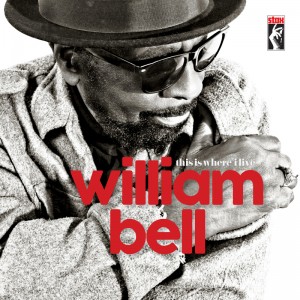 WILLIAM BELL
WILLIAM BELL
This Is Where I Live
Stax – STX 38939
Although Memphis native William Bell made his recording debut in 1956 with a vocal group called the Del-Rios for Lester Bihari’s Meteor label, backed by Rufus Thomas’ band, it would be another five years before he scored big as a solo singer with You Don’t Miss Your Water on Stax. The self-penned ballad, mixing elements of gospel and country, set the stylistic direction that much of southern soul music would take at Stax and other labels. His mellow low-tenor voice was featured on such subsequent hits as Everyday Will Be Like a Holiday, Private Number and I Forgot To Be Your Lover, all written by Bell in collaboration with Booker T. Jones, as was Albert King’s Born Under a Bad Sign. Ironically, Bell’s biggest hit, 1976’s R&B chart-topping Tryin’ to Love Two, appeared on Mercury a year after the demise of Stax.
Now 76 and recording for the revived Stax label, the Atlanta-based singer is in peak form on This Is Where I Live, produced by John Leventhal, a New York multi-instrumentalist and songwriter noted for his work with wife Rosanne Cash, Shawn Colvin and Jim Lauderdale. Other than an updated version of Born Under a Bad Sign, the disc’s remaining 11 songs are new to Bell’s discography. Nine are collaborations between Bell and Leventhal, many matching the intimacy of the singer’s classic works.
Ballads remain his forte. Some of the strongest in the new set are The House Always Wins, Poison in the Well, I Will Take Care of You, All The Things You Can’t Remember, People Want to Go Home and the Leventhal–Cash composition Walking on a Tightrope. Although not blues in structure, Bell recalls his grounding in the genre on Mississippi–Arkansas Bridge, a tune about a nightclub where artists such as B.B. King and Sonny Boy Williamson II once played
Bell’s warm voice is expertly supported by minimal instrumentation built around Leventhal’s overdubbed guitar, keyboard, bass, drum and percussion parts, with the occasional use of understated horns, strings and harmony vocals, on this laid-back masterpiece of southern soul.
—Lee Hildebrand
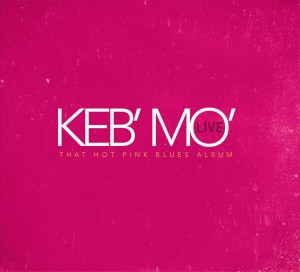 KEB’ MO’
KEB’ MO’
Keb’ Mo’ Live: That Hot Pink Blues Album
Kind Of Blue Music – No #
Keb’ Mo’ and his three-man band deliver 16 songs recorded during performances in nine cities—eight in the U.S., one in Canada—on That Hot Pink Blues Album, drawing on material from his eponymous 1994 debut album as Keb’ Mo’ (there’d been an earlier one as Kevin Moore) to his most recent, 2014’s Bluesamericana. Unlike 2009’s Live & Mo’, on which six of the ten tracks were done in concert, the new double-disc set is all the way live.
The leader moves between lead, slide and finger-picked guitar parts as he sings in warm, somewhat gritty low-tenor tones, with keyboardist Michael B. Hicks, bassist Stan Sargeant and drummer Casey Wasner adding harmony vocals from time to time. Together, they achieve a solid, remarkably full sound. They’re augmented on three selections—Life Is Beautiful, Come on Back and More Than One Way Home—by the Nashville String Orchestra.
Listening to Keb’ and company’s blues-imbued music is a feel-good experience. Positive messages fill many of his compositions. “I’m gonna make my world a better place. I’m gonna keep that smile on my face,” he sings on A Better Man from 1998. And on Life Is Beautiful from 2006, he croons, “On a stormy night somewhere in the world the sun is shining bright.”
There’s plenty of good humor, too. “I don’t like bologna and I don’t speak Japanese. When you make my macaroni, I want you to make it with that government cheese,” he sings on Government Cheese from 2009. And 2014’s The Worst Is Yet to Come contains the unforgettable lines: “Got back to my house. I opened up the door. She took everything I had, and the dog took a shit on the floor.”
That Hot Pink Blues Album is sure to put a smile on many a face.
—Lee Hildebrand
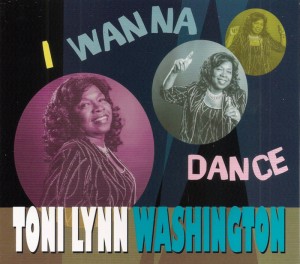 TONI LYNN WASHINGTON
TONI LYNN WASHINGTON
I Wanna Dance
Regina Royale – RRCD 15-071
It’s been awhile since we’ve heard from Toni Lynn Washington, Boston’s “Queen of the Blues” and longtime favorite among listeners familiar with her sparse recorded legacy. As evidenced by the cover art here, her approach is unabashedly rootsy—live instrumentation, vocals both seductively warm and powered with stouthearted resolve—even as her choice of material, as well as her arrangements, indicates a lively and far-ranging aesthetic. She’s equally at home with a jump-and-jive swinger (I Feel Like a Million); an uptown funk/jazz remake of the Little Walter classic Mellow Down Easy (showcasing her classy/sassy musical persona at its most delightful); a jubilant rock ’n’ roll updating of Sonny Boy Williamson’s Checkin’ Up on My Baby (with some appropriately manic ivory-bashing from pianist Bruce Bears), her own torchy I Can’t Get Over Losing You (think of the life-toughened resignation of a vintage blues chanteuse like Dinah Washington leavened by a slyly ironic little-girl mewl); and a hard-grinding take on Tracy Chapman’s Give Me One Reason (on which she mines Chapman’s theme to unearth the hard blues testimonial that’s always been at its heart).
Washington is a truly masterful vocalist—although she seldom ascends into anything more forceful than a medium-boil croon, she conveys intense emotion so deftly via understatement that we’re immediately enveloped in her spell. Her accompanists, meanwhile, can handle anything she might throw at them: guitarist Mike Williams, following in the daunting footsteps of previous Washington fretmen like Duke Robillard, plays like a veritable living catalogue of 20th-century blues, jazz blues and soul styles; saxophonists Sax Gordon and Amadee Castenell are hard-booting and soul-satisfying; keyboardist Bears is as versatile and inventive as he’s always been. Together, they and Washington purvey a roots-rich, yet fully contemporary blend of blues and blues-based musical satisfaction that seems to have come out of nowhere to attain a place near the top of this year’s new releases.
—David Whiteis
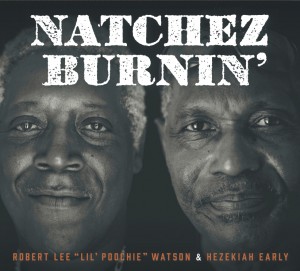 ROBERT LEE “LIL’ POOCHIE” WATSON & HEZEKIAH EARLY
ROBERT LEE “LIL’ POOCHIE” WATSON & HEZEKIAH EARLY
Natchez Burnin’
Broke & Hungry – BH13012
Multi-instrumentalist Hezekiah Early (born in 1934) and guitarist Robert Lee Watson (born in 1951) have both been singing and playing the blues in and around Natchez, Mississippi, for decades and were among the artists profiled when LB spotlighted that city’s blues scene back in 2010 (LB #210). While Early has previously recorded with guitarists Elmo Williams and James Baker and trombonist Pee Wee Whittaker, this is apparently Watson’s maiden recording.
The long musical association between Early and Watson allowed Broke & Hungry’s Jeff Konkel to record this disc in a single, three-hour session at a Cleveland, Mississippi, studio in February 2016—after all, they’d been “rehearsing” together in the local venues for years. Walton belts out the vocal on the opening Got My Eyes on You backed by his own rudimentary but propulsive guitar and Early’s rack-mounted harmonica and powerhouse drumming that belies his age. Watson keeps things rocking on deconstructed versions of Chuck Willis’ Feel So Bad, Louis Jordan’s Ain’t That Just Like a Woman, Fats Domino’s Hello Josephine and Rosco Gordon’s Just a Little Bit and applies his gravelly yet expressive voice to more ruminative fare on his own Mama Don’t Love Papa and Lightnin’ Hopkins’ Mr. Charlie. The two men share the vocals on Shooby Dooby Doo and Big Joe Turner’s Flip, Flop and Fly, while Early steps away from his drum seat to sing and play his own homemade guitar (sorry, no photos) on Baby Please Don’t Go and Somebody Changed the Lock while Watson lays out.
What this music may lack in sophistication, it more than makes up for in spontaneity and excitement—you can add Watson and Early to a long list of Mississippi guitar–drum combos that ranges from Trent Ayers and Cedric Burnside through T-Model Ford and Spam and all the way back to Woodrow Adams and Fiddlin’ Joe Martin.
—Jim DeKoster
 THE BO-KEYS
THE BO-KEYS
Heartaches By the Number
Omnivore – OVCD-172
By their previous albums, the Memphis-based Bo-Keys proved that they were worthy to carry on the tradition of their legendary predecessors, the Mar-Keys and Bar-Kays. On this, their third studio recording and first since the death of their original guitarist Skip Pitts in 2011, they’ve chosen to vary their thing by exploring the musical junction where soul meets country.
The set kicks off with guest vocalist Don Bryant—who, like Bo-Key pianist Archie Turner and drummer Howard Grimes, is a veteran of the Hi glory days—putting across a brassy rendition of Ray Price’s classic Heartaches By the Number that boasts a bluesy guitar solo by Joe Restivo. Elsewhere, the band’s regular vocalist, Memphis soul veteran Percy Wiggins, shines with his gospel-inflected interpretations of old-school country songs from Merle Haggard, Hank Williams and Curly Putman as well as on the Swamp Dogg classic Don’t Take Her (She’s All I’ve Got), which was popularized by Freddie North before being covered by country artists Johnny Paycheck and Conway Twitty, and the Freddy Fender Chicano / swamp pop / country ballad Wasted Days and Wasted Nights. A pair of band originals blend seamlessly with the classic fare, as does Wiggins’ soul-drenched take on Bob Dylan’s I Threw It All Away. The program closes with its only instrumental, Last Date, which originally hit for legendary Nashville studio pianist Floyd Cramer in 1960.
It was the Bo-Keys’ aim on this disc to create a program of jukebox singles to evoke—and resurrect—the glory days of Memphis soul. In this, they have succeeded admirably.
—Jim DeKoster
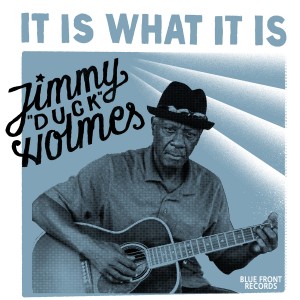 JIMMIE “DUCK” HOLMES
JIMMIE “DUCK” HOLMES
It Is What It Is
Blue Front Records – No #
It Is What It Is is Jimmy “Duck” Holmes’ debut disc on his own new record label, Blue Front Café. As many blues fans know, Blue Front Café is the name of the juke joint Holmes’ parents purchased in 1948 in Bentonia, Mississippi. Holmes is the owner and operator of what a Mississippi Blues Trail marker describes as an “informal, down-home blues venue that gained international fame among blues enthusiasts.” Locals, including one Skip James and traveling musicians (e.g., Sonny Boy Williamson II), played at the Blue Front Café, and this is where Holmes recorded his latest effort. It Is What It Is successfully captures a riveting self-contained performance etched in the power of the singer’s ethos and his ability—through music and words—to convey the pathos of pain and heartache.
It Is What It Is brims with plenty of grinding, distorted electric blues along with Holmes’ deep, raw and powerful voice riding on top of the mix. And there’s not much joy in his blues. In both music and lyrics, Holmes makes it plain—it is what it is. Whether articulated in the riffs or the sound of single notes being played, his guitar sounds like a wounded beast. The heaviness found on songs such as Buddy Brown and It Had to Be the Devil is balanced with “lighter,” acoustic fares such as So Glad and Slow Down. Still, the eight-song disc speaks to life’s unpredictable and unkind moments.
The resigned and realistic themes that emerge in most of the songs center on the sine qua non of blues lyrics—toxic and troubled relationships with women. In Pencil and Paper, Holmes’ “little girl” left him without warning or explanation. In his despair and loneliness, Holmes sings, “I got no telephone / but I just want to drop her one or two lines.” What he wrote, we will never know. The title song finds Holmes looking for answers following yet another failed relationship marked by infidelity. In Love Alone, love—without some financial security—is insufficient for the long haul. While often left without explanation for his relationship troubles, Holmes realizes on Had to Be the Devil that Satan, and no “natural man,” changed his “baby’s mind.” Slow Down is a warning song for a fast woman who Holmes predicts will end up in an “early grave.” Toward the end of the disc on So Glad (not the same song as Skip James’ I’m So Glad), the singer finds some solace that his woman will return home. He admits that he has “never felt so good before.”
The disc is best enjoyed in one sitting—the consistent sound and tempo (along with the fact that most songs hover around the four- to six-minute mark) create a kind of trance-like hypnotic monotony that makes for a compelling listening experience. Blues enthusiasts who enjoy their blues raw and honest will relish It Is What It Is.
—Stephen A. King
 JANIVA MAGNESS
JANIVA MAGNESS
Love Wins Again
Blue Élan Records – BER1017
Janiva Magness continues to move from strength to strength. Her 2014 recording Original earned her a Blues Music Award, and her latest album is already notching up various industry charts. A joint release between the Los Angeles–based singer-songwriter’s own Fathead label and Blue Élan Records, Love Wins Again is finely executed and imbued with joy.
Magness once again teams with producer Dave Darling, who wrote or co-wrote nine of the album’s 11 songs and contributed guitar, bass and backing vocals as well. The gospel-infused title track raises the roof with Arlan Schierbaum’s organ and a choir of voices that includes Magness’ husband, the English musician T.J. Norton. Similar spirits and themes of love redeemed inhabit the rousing Say You Will, the yielding Doorway and the gently driving Rain Down. Steely guitars and relentless bass give the sultry grind of Real Slow a hard edge. Magness sings When You Hold Me with warm, powerful ease, and Alfredo Ballesteros’ peppery sax spices up the sweetly yearning ballad. Moth to a Flame flickers passionately, as does the James Brown–esque Your House is Burnin’ and her deeply felt cover of John Fogerty’s Long As I Can See the Light.
The resigned, acoustic Just Another Lesson is the bruised B-side to the title track—“Sometimes that thing that you fight for / Is gone when you turn around.” Likewise, a tempered wistfulness runs through Who Will Come For Me. “When all my youth is spent / Song comes to an end / I’ll see you again / It’s been so long, my friend,” she affirms, as the song—and album—ends on an unresolved, yet hopeful note.
Loaded with passionate performances and songcraft, Love Wins Again is a knockout addition to Janiva Magness’ stellar catalogue.
—Melanie Young
 MIKE WHEELER BAND
MIKE WHEELER BAND
Turn Up!!
Delmark – DE 845
Mike Wheeler was born in Chicago in 1961. He began his career as a bluesman playing guitar in the band of pianist Lovie Lee back in the mid-’80s and continued to pay his dues by gigging around the South Side with artists such as Charles Crane, Nellie Travis, Joan Baby, Cadillac Dave and Sam Cockrell before catching on with trombonist Big James’ Chicago Playboys in 1998. While keeping his hand in with the Playboys, he’s also worked on his own for the last 15 years with Brian James on keyboards and fellow Playboys Larry Williams and Cleo Cole on bass and drums, respectively. This is the group’s third CD, following a self-produced release on Chilla in 2003 and Self-Made Man for Delmark in 2012.
It’s immediately evident from the opening, Sweet Girl, that this is a working band and not just a hastily assembled ad hoc ensemble. Like most of the 13-song playlist, it’s a hard hitting uptempo number with Williams and Cole locking in to provide the moving force for James’ swirling organ and the leader’s forceful vocals and blistering guitar lines.There’s a strong rock influence on Brand New Cadillac, but Talking to Myself and I’m Hooked are jazzy swingers and the tempo slows for A Blind Man Can See and the closing Sad State of the World. The addition of Kenny Anderson’s trumpet and Hank Ford’s tenor sax lends a bit of a Playboys touch to several tracks.
Just how far Wheeler and his mates have come since their first recording is evident from a comparison of Little Milton’s That’s What Love Will Make You Do (the set’s only cover) with the earlier version on Chilla. While the first recording stands up well enough on its own, it pales in view of the newer rendition’s elevated execution and assurance—dig in particular the evolution of Williams’ bass line into the finger-busting solo on this disc. This is contemporary blues performed at a very high level.
—Jim DeKoster
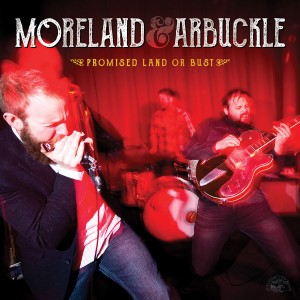
MORELAND & ARBUCKLE
Promised Land or Bust
Alligator Records – ALCD 4971
For more than a decade, guitarist Aaron Moreland and singer-harpist Dustin Arbuckle have been honing their raw, potent blend of roots rock to increasing acclaim. The latest release from the Kansas-based outfit is also their first for Alligator Records, and Promised Land or Bust sounds like they’re well on their way.
Mean and Evil’s droning stomp sounds as if R.L. Burnside could’ve written it; Long Did I Hide It is likewise shot through with straight-ahead, Hill Country–style rhythms. Moreland pours molten, furious fretwork over the bloodcurdling Hannah and swathes their gnarly take on Slim Harpo’s I’m a King Bee in atmospheric sheen. Kendall Newby’s powerful drumming fuels rocking cuts like Take Me With You (When You Go), When the Lights are Burning Low and Long Way Home.
Lee McBee’s Woman Down in Arkansas is a fun, swaggering shot of honky-tonk blues, and Arbuckle tosses off some lyrical harp licks on their faithful cover. Mount Comfort’s laidback grooves and the gently acoustic Waco Avenue provide ample room for Arbuckle’s clear, full-throated vocals to shine. The dramatic, slightly tongue-in-cheek Why’d She Have to Go (and Let Me Down)? is infused with a late-night, last-call feel.
Fans of bands like the North Mississippi Allstars would do well to give Moreland & Arbuckle’s Promised Land or Bust a spin.
—Melanie Young
PROFESSOR LONGHAIR
Live in Chicago
Orleans Records – 2915
Having a profound influence in the blues world is not dependent on a large discography, as exemplified by such giants as Robert Johnson and Blind Willie Johnson. Professor Longhair certainly had a much more extensive recording career than either of the Johnsons, but considering his vast influence on both blues piano and New Orleans R&B, he is woefully underrepresented on recordings. The singles he recorded during his initial career have been collected on just two compact discs. He recorded roughly four studio albums after he was rediscovered at the close of the 1960s, and only one of those was released while he was alive. It really is a shame that he was playing around New Orleans for over 30 years, and the music business could not find a niche for him. Thankfully, quite a few shows from his ten-year revival were recorded, resulting in a number of live albums—from the Queen Mary, from London, from Germany and from his home base, Tipitina’s. The repertoire is pretty similar from show to show, but Longhair was an improvising musician who clearly fed off his band and his audience, so no two versions of any number are the same. (This could also be said for Thelonious Monk later in his career.) And, what is inescapable with Longhair is the absolute joy that emanates from him when he makes music.
So, the recent surfacing of Live in Chicago, a recording from the University of Chicago Folk Festival on February 1, 1976, that had been broadcast on WFMT-FM, is cause for celebration. It is really simple—the more Fess, the better! The set clocks in at just over 29 minutes and features seven tunes. What makes this particular recording unique is that it documents an edition of Longhair’s band that featured Bill Gregory and Will Harvey on guitars, Julius Farmer on bass and Earl Gordon on drums. Longhair frequently worked with guitarists, including Papoose Nelson, Snooks Eaglin, Gatemouth Brown and Mac Rebennack, but two guitars? As much piano as he played, it might seem that trying to mix in two guitars would get cluttered, but they work together to bring out the funk like a well-oiled machine. Before joining the band, Gregory spent a number of years in San Francisco playing in It’s a Beautiful Day, regulars on the Fillmore scene. It may seem like a stretch go from the center of the “love generation” to Longhair’s gumbo zone, but the leader consistently calls out for “Bill” when it is time for a solo, and Gregory delivers these searing, tightly constructed gems that are locked right into that second line groove. That impromptu spirit is apparent on Every Day I Have the Blues. As he introduces the tune, Longhair comments, “Haven’t did it for quite a while,” and the band seems to stumble a bit. His vocal comes in late, and he sings part of a line from CC Rider, but the band keeps grooving until they finally lock in; then, the second time around, they are off to the races. Throughout Live in Chicago, Fess is in great voice and his chops on what sounds like an electric piano are finely honed. It is a welcome addition to the discography, and the world is simply a better place with more Professor Longhair!
—Robert H. Cataliotti


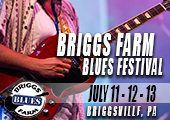



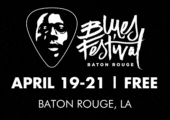
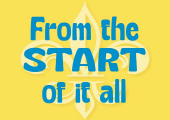











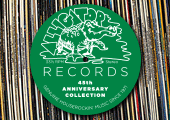
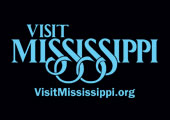
been lovin FESS since the first i heard him 1968, thank you MR ROY BYRD